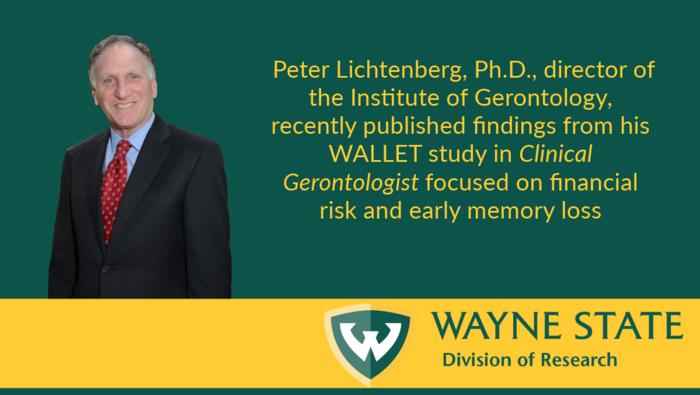DETROIT — Early memory loss has been linked to wealth loss, but research has mostly focused on investments. Four years ago, clinical geropsychologist Peter Lichtenberg, Ph.D., wondered what clues might be found in an older person’s financial decisions to indicate their vulnerability to financial victimization. Lichtenberg is director of the Institute of Gerontology at Wayne State University and a national expert in the financial exploitation of older adults. The results of his curiosity have now been published as “The WALLET Study: Financial Decision Making and Key Financial Behaviors Associated with Excess Spending” in the May 2024 issue of Clinical Gerontologist.

Credit: Wayne State University
DETROIT — Early memory loss has been linked to wealth loss, but research has mostly focused on investments. Four years ago, clinical geropsychologist Peter Lichtenberg, Ph.D., wondered what clues might be found in an older person’s financial decisions to indicate their vulnerability to financial victimization. Lichtenberg is director of the Institute of Gerontology at Wayne State University and a national expert in the financial exploitation of older adults. The results of his curiosity have now been published as “The WALLET Study: Financial Decision Making and Key Financial Behaviors Associated with Excess Spending” in the May 2024 issue of Clinical Gerontologist.
To answer the vulnerability question, Lichtenberg devised the WALLET (Wealth Accumulations & Later-life Losses in Early cognitive Transitions) study. WALLET takes the unique approach of analyzing a year’s worth of participants’ checking account statements for signs of excess spending and other anomalies. Results from the study’s 150 participants offer important clues about the intersection of financial risk and early memory loss.
Participants ranged in age from 59 to 96, with about half having perceived or mild cognitive impairment. All were interviewed on health status and assessed for memory function, financial decision-making and financial literacy. Excess spending was determined by subtracting budgeted expenditures from income, with negative amounts receiving a percentage score.
Lichtenberg and his team hypothesized that three factors would be significantly associated with excess spending: early memory loss, as well as scores on two scales created by Lichtenberg, the Financial Decision Rating Scale and the Financial Vulnerability Index. Early memory loss was a predictor of excess spending. The association between early memory loss and excess spending was accounted for by scores on the Financial Decision Rating Scale and the Financial Vulnerability Index.
“Financial capacity is multidimensional,” Lichtenberg said. “The WALLET study demonstrates the important links between cognitive status, other financial abilities and excess spending.”
Lichtenberg is particularly pleased with the study’s successful use of financial data from actual bank statements. “Discussion of finances is often considered taboo,” he said. Yet, his team was able to sensitively acquire copies of participant bank statements – even during the isolating years of COVID-19.
“Establishing trust with each participant was paramount to reviewing this data,” he said. “Our results show the viability of this approach, however, and especially how financial decision-making and management can impact wealth loss.” Lichtenberg will present results of the WALLET study at the Alzheimer’s Association International Conference in Philadelphia on July 31.
This work was supported by the National Institutes of Health P30 AG015281,
Michigan Center for Urban African American Aging Research; National Institutes of Health Michigan Alzheimer’s Center Core grant #P30AG072931 and the National Institutes of Health R21AG067405.
###
About Wayne State University
Wayne State University is one of the nation’s pre-eminent public research universities in an urban setting. Through its multidisciplinary approach to research and education, and its ongoing collaboration with government, industry and other institutions, the university seeks to enhance economic growth and improve the quality of life in the city of Detroit, state of Michigan and throughout the world. For more information about research at Wayne State University, visit research.wayne.edu.
Wayne State University’s research efforts are dedicated to a prosperity agenda that betters the lives of our students, supports our faculty in pushing the boundaries of knowledge and innovation further, and strengthens the bonds that interconnect Wayne State and our community. To learn more about Wayne State University’s prosperity agenda, visit president.wayne.edu/prosperity-agenda.
Journal
Clinical Gerontologist
DOI
10.1080/07317115.2024.2348049
Method of Research
Content analysis
Subject of Research
People
Article Title
The WALLET Study: Financial Decision Making and Key Financial Behaviors Associated with Excess Spending
Article Publication Date
2-May-2024
COI Statement
Peter Lichtenberg Consultancy, LLC was created to maximize the use of financial decision-making and vulnerability tools.




